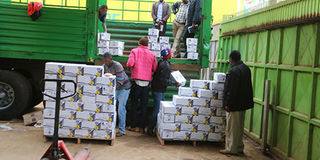Premium
Kenya's beef with Uganda, Tanzania over milk, chicken

Workers at Musty distribution depot in Makutano, Meru County, remove cartons of Lato long-life milk on January 7, 2020 after police and anti-counterfeit officials raided the facility. PHOTO | FILE | NATION MEDIA GROUP
What you need to know:
Some 3000 packets of milk had been withdrawn from traders in various parts of the country, in what authorities argued was the penalty for trying to sell an unsafe food products.
Overall, some 54, 310 kilos of powdered milk had been confiscated.
Three years ago, Kenya protested to Tanzania after Dar es Salaam burned chicks exported to Tanzania to ostensibly control any poultry diseases.
Uganda’s Lato Milk’s slogan says it should be “pure and tasty.”
But the product has lately been short of pure, authorities in Nairobi claim.
Since December, the police, Kenya Bureau of Standards and the Kenya Revenue Authority have confiscated some packets of powdered milk from the Ugandan brand, saying they are substandard.
This week, Uganda’s Foreign Minister Sam Kutesa wrote a protest letter to Kenya’s High Commissioner to Uganda Kiema Kilonzo, expressing the “illegal seizure” of Ugandan milk products in Kenya.
Some 3000 packets of milk had been withdrawn from traders in various parts of the country, in what authorities argued was the penalty for trying to sell an unsafe food products.
LOSSES
There had been losses, Kutesa’s Ministry said on Thursday, of about Sh36 million ($360,000) after Kenya raided traders three times this month, including last week. Overall, some 54, 310 kilos of powdered milk had been confiscated.
Last year, Ugandan diplomats had quietly complained to Kenya of insufficient security at their mission in Nairobi, and the consulate in Mombasa. Nairobi responded by sending more police to guard the premises.
So what is the issue with Lato? The milk often used to cross into Rwanda, and sold to most parts of Uganda, competing with other products like Jessa milk, GBK Dairy and Fresh Dairy.
Then Rwanda relations cooled and traders saw Kenya as an opportunity. It sells cheaper than local products.
“It is not unusual to find in our local traders selling only Ugandan milk. The reason being the higher pricing of our milk,” Judith Maketso, the Trade Minister in Busia County told the Nation on Friday.
“Busia being a border county is highly disadvantaged because of the higher Kenyan tax regime. That is why Kenyan traders go for the Ugandan products,” she added.
TRADE ROUTES
Though authorities say they are only after safety and legal trade routes, the confiscation has taken an argument to the East African Community.
Mr Clement Onyango, the director at trade policy think-tank, argued the recent crackdown by Kenya is just part of the usual non-tariff barriers in the EAC, arbitrary policies that countries launch to stop free movement of goods.
“NTBS are akin to a game of musical chairs, you resolve one and another crops up,” Mr Onyango said, referring to mechanisms listed in the EAC laws of resolving them.
Kenya has in the past received whips of Non-Tariffs Barriers Survey (NTBs) from Uganda and Tanzania. Three years ago, Kenya protested to Tanzania after Dar es Salaam burned chicks exported to Tanzania to ostensibly control any poultry diseases.
Tanzania also followed with confiscation of Kenyan herders’ cattle as fines for trespass. Nairobi had to compensate herders at Sh53 million for the 1,325 animals taken.
BEEF
Kenya, Uganda, Tanzania, Rwanda and Burundi, belong to the EAC and their people like beef, milk and chicken. But why does everyone pay back with the same coin?
“They know how much Kenya needs their markets so there are bits of emotions stemming from hitherto smaller economies.
“There is, however a political economy to this, that is who controls what. Apparently, western Kenya prefers Lato milk and the amount of importation has been increasing,” Mr Onyango told the Nation.
That increase in supply threatens local products like Brookeside or Tuzo so Nairobi has questioned whether Uganda is able to produce so much powdered milk for export.
In 2019, some 110 milk was reportedly produced there, using what is called the Rules of Origin inquiry. Under EAC, Kenya cannot stop goods produced in Uganda from reaching Kenyan market.
It cannot also impose taxes not usually charged on Kenyan goods. Some experts warned the see-saw of NTBs could curtail the meaning of EAC.
“With cases like confiscation of milk, burning of chicks, threatening of Tanzanians in Gikomba market or blame game between Rwanda and Uganda; it creates a very bad impression for the bigger dream of integration,” warned George Mucee, Practice Leader at migration consultancy firm Frogmen-Kenya in Nairobi.
“Ordinary people in the streets of Nairobi, Kampala, Arusha or Kigali may not see the need of integration.”





